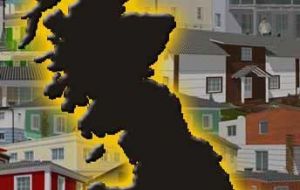MercoPress. South Atlantic News Agency
Inflation/growth dilemma leaves UK rates on hold at 5%

The Bank of England Monetary Policy Committee (MPC) decided on Thursday to keep interest rates on hold at 5% for a fifth month as it struggles to deal with a slowing economy and soaring inflation.
But with reports signaling the economy is heading for recession expectations are rising that rates may have to be cut either this year or early in 2009, reports BBC. Economic growth ground to a halt in the second quarter of this year, the worst performance since the early nineties, but inflation is more than double the Bank's target of 2%. Ian McCafferty, CBI chief economic adviser, said the MPC decision shows that it is still concerned about inflation, which is likely to rise to around 5% in coming months. "But as the autumn unfolds, the chances of a rate cut will increase, as the slowdown improves the inflation outlook for next year," he said. Some analysts reckon that rates could fall as low as 3.5% next year. With house prices tumbling and High Street confidence brittle, pressure is growing on the MPC to act sooner rather than later. UK house prices recorded an annual fall of 10.9% in August, according to the latest figures from Halifax. TUC Head of Economics and Social Affairs Adam Lent said with a recession on the cards, inflation was no longer the main threat to the economy. "This is a depressing decision" he said. "A cut today would have offered hope to all those who fear for their jobs and homes, and helped cut through the economic pessimism that is now doing as much damage as the credit crunch and energy prices". The OECD has forecast that the UK economy will contract in the current quarter and the next - meeting the official definition of a recession. This chimes with the Bank of England's own forecast. Governor Mervyn King said last month the UK economy would go through a "difficult and painful adjustment" with "broadly flat" growth. Chancellor Alistair Darling heightened concerns about the resilience of the economy when he said recently that conditions facing the UK and other countries were "arguably the worst in 60 years". The gloomy forecasts about the economy have hit the pound, which has been falling against the dollar and the Euro, and has had its worst month against the US currency since 1992. However, sterling regained some poise on Thursday, clawing back some ground against the dollar and the Euro. A three-way voting split on the MPC in recent months has highlighted the difficulties facing the body in the current troubled climate. David Blanchflower has persistently called for rate cuts to support the faltering economy and has warned of a sharp jump in unemployment if no action is taken. However, another external member of the MPC, Tim Besley, remains more hawkish urging a rise in rates to contain inflation which many experts believe could soon hit 5%. While the other seven members of the MPC have voted for rates to stay on hold for several months, many experts believe they will not be able to hold this line for much longer. "All good things come to an end, and, unfortunately, UK growth is no exception," said Stuart Porteous, head of group economics at RBS. "After the economy broke its astonishing winning streak of fifteen years of continuous growth this summer, the next UK rate move will almost certainly be down; but not just yet. "The MPC looks set to keep rates on hold until it is unambiguously clear that inflation has passed its peak - and that probably won't happen until early in 2009".




Top Comments
Disclaimer & comment rulesCommenting for this story is now closed.
If you have a Facebook account, become a fan and comment on our Facebook Page!